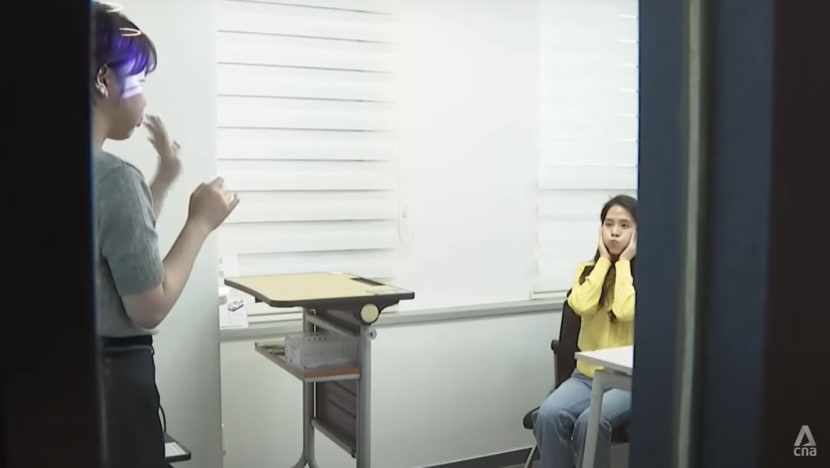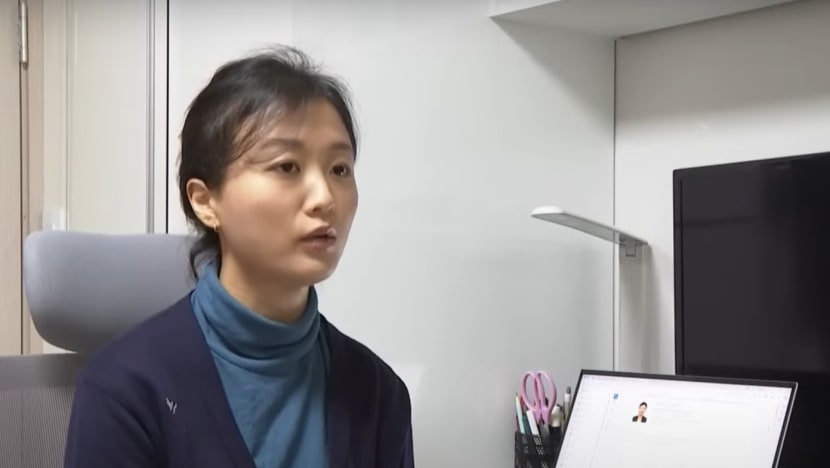Hiring freeze, reluctance to work at small firms: Young South Koreans’ difficulties in getting a job
An estimated 248,000 South Koreans in their 20s are jobless as of March this year, according to the country’s national statistical office.

Students undergoing a course at W Speech Training Centre in Seoul, South Korea.

This audio is generated by an AI tool.
SEOUL: Almost two years after graduating from a prestigious university in Seoul with a master’s degree, Ms Han Sung Ju remains unemployed.
The 28-year-old South Korean has taken up her third internship since completing her studies, having applied for more than 100 positions with no luck.
She hopes to eventually land a job that pays more than US$30,000 a year, but she knows her chances are slim.
Large firms have in recent years cut back on hiring and put in place stricter screening criteria.
"The job market has always been tough but in recent years, it has become even more challenging, with the economic downturn. There is a freeze in hiring, especially for experienced positions,” the English literature major told CNA.
Ms Han is among an estimated 248,000 South Koreans in their 20s who were jobless as of March this year, according to the country’s national statistical office.
Government figures released last year also showed that nearly four in 10 young unemployed Koreans have been without a job for the past three years. On average, it takes more than 10 months for someone to find employment after graduation.
MANY WANT JOBS AT BIG FIRMS
Many South Korean youths like Ms Han aspire to join large companies where they can earn more. The wage gap between small and large companies has been at almost double for several years.
This has led to a chronic labour shortage at small- and medium-sized firms, which account for 80.9 per cent of employment, reported The Korea Herald last year.
Experts said there is a need to help young workers – many who prefer to focus on non-traditional modes of work – feel more secure. The availability of safety nets and a better support system could encourage them to seek employment opportunities outside of bigger firms, they added.
Dr Lim Tai Wei, adjunct senior research fellow from the National University of Singapore’s East Asian Institute, said part-time jobs in the gig economy are on the rise.
“This changing mode of employment is probably going to be increasing in number, following the examples that you see in even more advanced economies,” he told CNA’s East Asia Tonight programme.
Ms Han said she has mainly been applying for overseas sales positions, as well as roles in strategic planning and purchasing sales management.
“Initially, I aimed for around 50 million won (US$36,300), but it's rare for companies other than large corporations to offer such salaries. So I'm aiming for over 40 million won, but I'm also applying to positions with lower salaries,” she added.
Ms Han has also struggled with artificial intelligence tests and personality assessments, leading to rejections from prospective employers.
Besides these tests, which aim to gauge whether an applicant fits the company's culture, many Korean firms require jobseekers to ace English proficiency exams.

TRAINING CENTRES
Around the country, training centres have sprouted up to help – and cash in on – the huge pool of jobseekers.
For instance, the W Speech Training Centre in Seoul, which teaches communication skills, has seen an increasing number of enrolment for its courses despite its price tag. The firm’s most popular eight-week course costs 650,000 won (US$475).
Students at the centre learn how to speak up at interviews and improve their articulation.
The centre’s assistant manager Cho Hee Youn said that on average, about 85 per cent of its students secure jobs. Its clients range from university students to graduates, to those who failed multiple times in their job searches.
Ms Kim Doyeon, 29, who is currently attending such a course at the centre, hopes to be one of these lucky ones. She told CNA that the job market has become more competitive since the COVID-19 pandemic.
Ms Kim previously worked in the luxury retail industry and is now interviewing with major airlines. She, too, is one of the many South Korean youths who want to work in a large firm.
“There was a saying that the higher your academic achievements and language proficiency, the better,” she said.
“It feels like everything needs to be top-notch now, which makes it quite challenging.”














